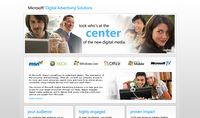
Buzz words can be true enemies. When I talk about Web 2.0, sometimes at length, a lot of debating takes place on a number of topics before I finally ask: "
But what does Web 2.0 mean to you?". Let me save you the clueless faces and the typical "
you know, web 2.0" reinforced by a supposedly mutual understanding face. Very often though, I hear AJAX and rich web client interfaces are the underpinning revolution attached to Web 2.0.
Well, all of this is true. Let's refer to Tim O'Reilly's definition of Web 2.0, as he coined the term back in Sept. 2005. In the Web 2.0 world, the web is a platform not a destination. Thus Tim elaborates with this Netscape vs. Google comparison to support his claim. Netscape flagship product was a web browser i.e. a desktop application, Google flagship product is a web service.
What really is interesting to us marketers about Web 2.0 is not the technology which has always been means to an end, but the social implication of opening up collaboration to all web users and among them your customers, partners, influencers, journalists and analysts. I was happy to read that Jay Adelson, Digg CEO, just thinks the same:
"To me Web 2.0 is not a technology revolution. It's rather users accepting the idea of collaborating."
You can refer to Jay's interview if you read french. Here it is.
Web 2.0 for us marketers is an acceleration of empowered customers and consumers two ways communicating with our brands and among themselves. Be sure to capture this inter-customer communication not to avoid growing negative buzz, as we highlighted here in Marketing 2.0 for Dell.
To me, Web 2.0 is the today's answer to the non effective advertising cloud addressing ad-educated populations. In a way, it drives us to being positioned properly and relevant to prospect audiences and to lead with transparency in our communication. This is another chapter of our Marketing 2.0 Manifesto.
 Following my last post, just a quick heads-up note on Yahoo (YHOO) rebound. Apparently things are moving in the right direction again for Yahoo , reports Business Week, as Merrill Lynch changed their rating. The stock rose 3.3% in one day.
Following my last post, just a quick heads-up note on Yahoo (YHOO) rebound. Apparently things are moving in the right direction again for Yahoo , reports Business Week, as Merrill Lynch changed their rating. The stock rose 3.3% in one day. 



